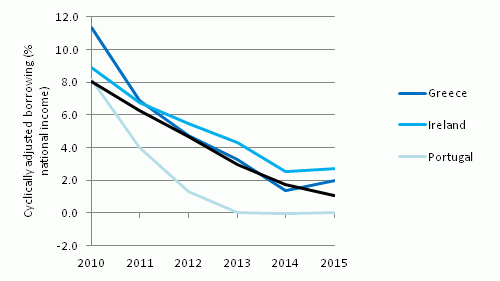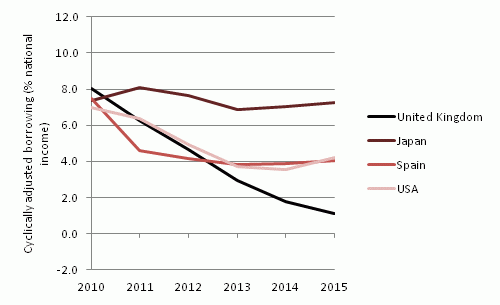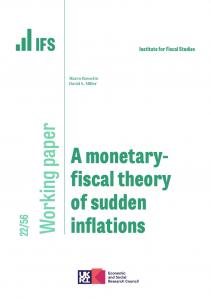Yesterday the International Monetary Fund (IMF) published its latest Fiscal Monitor, which surveys public finance developments across the world and updates their fiscal projections. The UK launch of the report was held at the IFS in London on 5 October (here). The data in the report can be used to provide a useful comparison of the effects of the financial crisis on the public finances in the UK with the effects felt abroad, and some indication of how the coalition government's planned fiscal consolidation currently stacks up against those planned in other countries.
Back in 2007, out of the 28 advanced economies for which the IMF compiles data, the UK is judged to have had the fourth highest level of cyclically-adjusted borrowing (that is, underlying borrowing, after adjusting to take account of the estimated impact of the ups and downs of the economic cycle). In other words, the UK entered the financial crisis and recession in a relatively poor position, with a level of cyclically-adjusted borrowing that is thought by the IMF only to be exceeded by that seen in Greece, Ireland and Portugal. As we have previously shown this is because while public sector borrowing was cut by Labour over the period from coming to office in 1997 and the start of the financial crisis in 2007 it was not reduced by as much as in the vast majority of other major industrialised countries over this period.
The crisis also affected the UK economy and public finances relatively badly. The UK experienced the 9th largest deterioration in its fiscal position during the crisis, resulting in us reaching the fifth highest level of cyclically-adjusted borrowing across the 28 countries (with the UK's peak level of cyclically-adjusted borrowing reached in 2009).
Table: UK's level of and change in borrowing between 2007 and 2015, compared to 27 other advanced economies
UK rank Notes
Cyclically adjusted borrowing
Level
2007 (pre-crisis)4th highestGreece, Ireland and Portugal higher
Peak year5th highestGreece, Iceland, Ireland, Spain higher
201516th highest
Change
Increase, 2007 to peak9th largest
Reduction, peak to 20155th largestGreece, Iceland, Ireland and Portugal larger
Reduction, 2007 to 20154th largestGreece, Ireland and Portugal larger
The 28 advanced economies on which data comparable to the UK are available are: Australia, Austria, Belgium, Canada, Czech Republic, Denmark, Finland, France, Germany, Greece, Hong Kong, Iceland, Ireland, Israel, Italy, Japan, Netherlands, New Zealand, Norway, Portugal, Singapore, Slovakia, Slovenia, South Korea, Spain, Sweden, Switzerland and the United States.
The coalition government has set out a fiscal consolidation plan which is projected by the IMF to see cyclically-adjusted borrowing reduced year-on-year until 2015. This is currently forecast to be the 5th largest reduction in cyclically-adjusted borrowing among the advanced countries considered by the IMF - only Greece, Iceland, Ireland and Portugal are currently on course to see a larger reduction.
The Figure below compares the size, timing and ultimate effect of the fiscal consolidation planned by the UK's coalition government between 2010 and 2015 to the fiscal plans of various other countries who are judged to have had similar levels of cyclically-adjusted borrowing to the UK in 2010. These can be broadly divided into two groups: those with a similar profile of fiscal tightening to the UK (shown in panel a) who are forecast to end up in a much stronger fiscal position by 2015 than they were in 2010, and those with a much slower profile for tightening (if any) than the UK (shown in panel b), who on current plans are not expected to reduce their borrowing position as substantially by 2015.
Panel (a) shows that Greece and Ireland had a slightly worse borrowing position than the UK in 2010, but are forecast to be on course to cut borrowing similarly rapidly through to 2014. Portugal meanwhile also had a similar level of borrowing in 2010 but is forecast to be on course to complete its planned tightening in 2013. The UK is currently unique amongst these countries in that the coalition's planned tightening already continues through to 2015, and therefore the UK is currently forecast to end in a better borrowing position than both Greece and Ireland. All four of these countries (including the UK) are forecast to be in a much better borrowing position by 2015 than they were in 2010. The other country that is tightening faster than the UK between 2010 and 2015 is Iceland, but the profile for the consolidation over this period only tells part of the story for Iceland; their cyclically-adjusted borrowing has already been brought down by nearly 10% of national income between 2008 and 2010.
Panel (b) shows that Spain, Japan and the USA all have slightly better cyclically-adjusted borrowing positions than the UK in 2010. The USA and Spain are forecast to experience a similar magnitude of fiscal tightening to the UK between 2010 and 2013 but with little further tightening planned thereafter. This would leave them with a relatively weak cyclically-adjusted borrowing position in 2015, forecast at over 4% of national income, suggesting that further measures to reduce borrowing are more likely to be needed in those countries. Japan, whose fiscal position has been affected not only by the global recession but also by a series of natural disasters, is forecast by the IMF to have continued loose fiscal policy over each of the next five years and cyclically-adjusted borrowing still in excess of 7% of national income in 2015.
Figure 1: How do the fiscal consolidations planned in other industrialised countries compare to the UK's plans?


There are of course many other advanced countries, which have had lower levels of cyclically-adjusted borrowing over the last few years than the UK. Generally speaking these countries are currently planning only small fiscal consolidations over this period, if they are planning reductions at all.
This comparison of the coalition government's fiscal consolidation plans with those in other countries is a picture that may change over time. Some other countries - particularly those highlighted in panel (b) - may eventually extend their plans for tightening. But there is no escaping the fact that the UK was affected relatively badly by the crisis and the government's plans will need to be harsher than those of most other advanced economies if we do not want the UK to remain with relatively high levels of public sector borrowing, which is where it stood before the financial crisis and where it currently stands.
The UK launch of the latest IMF Fiscal Monitor was held at the IFS on 5 October - click here for more details.









